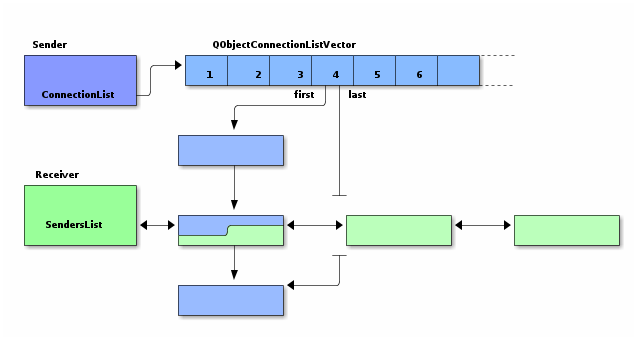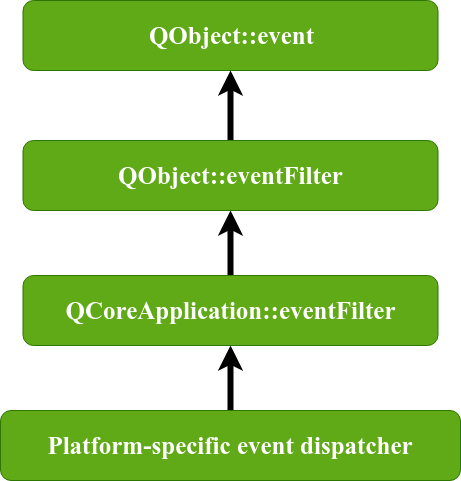Qt Signal Slot Queued Connection
- Qt Signal Slot Queued Connections
- Qt Signal Slot Queued Connection Download
- Qt Signal Slot Queued Connection Tool
- Qt Signal Slot Queuedconnection
Qt Using Qt:DirectConnection when receiver object doesn't receive signal Example Some times you see a signal is emitted in sender thread but connected slot doesn't called (in other words it doesn't receive signal), you have asked about it and finaly got that the connection type Qt::DirectConnection would fix it, so the problem found. Lorsque j'utilise BlockingQueuedConnection, j'obtiens le message suivant, et le signal n'appelle pas le slot: Qt: Dead lock detected while activating a BlockingQueuedConnection: Sender is QTcpServer(0x2392018), receiver is Machine(0x23336a8).

How often is a an object copied, if it is emitted by a signal as a const reference and received by a slot as a const reference? How does the behaviour differ for direct and queued signal-slot connections? What changes if we emit the object by value or receive it by value?
Nearly every customer asks this question at some point in a project. The Qt documentation doesn’t say a word about it. There is a good discussion on stackoverflow, which unfortunately leaves it to the reader to pick the right answer from all the answers and comments. So, let’s have a systematic and detailed look at how arguments are passed to signals and slots.
Setting the Stage
For our experiments, we need a copyable class that we will pass by const reference or by value to signals and slots. The class – let’s call it Copy – looks as follows.
The copy constructor and the assignment operator simply perform a member-wise copy – like the compiler generated versions would do. We implement them explicitly to set breakpoints or to print debugging messages. The default constructor is only required for queued connections. We’ll learn the reason later.
We need another class, MainView, which ultimately derives from QObject. MainView provides the following signals and slots.
MainView provides four signal-slot connections for each connection type.
The above code is used for direct connections. For queued connections, we comment out the first line and uncomment the second and third line.
The code for emitting the signals looks as follows:
Direct Connections
sendConstRef => receiveConstRef
We best set breakpoints in the copy constructor and assignment operator of the Copy class. If our program only calls emit sendConstRef(c), the breakpoints are not hit at all. So, no copies happen. Why?
The result is not really surprising, because this is exactly how passing arguments as const references in C++ works and because a direct signal-slot connection is nothing else but a chain of synchronous or direct C++ function calls.
Nevertheless, it is instructive to look at the chain of function calls executed when the sendConstRef signal is emitted.
The meta-object code of steps 2, 3 and 4 – for marshalling the arguments of a signal, routing the emitted signal to the connected slots and de-marshalling the arguments for the slot, respectively – is written in such a way that no copying of the arguments occurs. This leaves us with two places, where copying of a Copy object could potentially occur: when passing the Copy object to the functions MainView::sendConstRef or MainView::receiveConstRef.
These two places are governed by standard C++ behaviour. Copying is not needed, because both functions take their arguments as const references. There are also no life-time issues for the Copy object, because receiveConstRef returns before the Copy object goes out of scope at the end of sendConstRef.
sendConstRef => receiveValue
Based on the detailed analysis in the last section, we can easily figure out that only one copy is needed in this scenario. When qt_static_meta_call calls receiveValue(Copy c) in step 4, the original Copy object is passed by value and hence must be copied.

sendValue => receiveConstRef
One copy happens, when the Copy object is passed by value to sendValue by value.
sendValue => receiveValue

This is the worst case. Two copies happen, one when the Copy object is passed to sendValue by value and another one when the Copy object is passed to receiveValue by value.
Qt Signal Slot Queued Connections
Queued Connections
A queued signal-slot connection is nothing else but an asynchronous function call. Conceptually, the routing function QMetaObject::activate does not call the slot directly any more, but creates a command object from the slot and its arguments and inserts this command object into the event queue. When it is the command object’s turn, the dispatcher of the event loop will remove the command object from the queue and execute it by calling the slot.
When QMetaObject::activate creates the command object, it stores a copy of the Copy object in the command object. Therefore, we have one extra copy for every signal-slot combination.
We must register the Copy class with Qt’s meta-object system with the command qRegisterMetaType('Copy'); in order to make the routing of QMetaObject::activate work. Any meta type is required to have a public default constructor, copy constructor and destructor. That’s why Copy has a default constructor.
Queued connections do not only work for situations where the sender of the signal and the receiver of the signal are in the same thread, but also when the sender and receiver are in different threads. Even in a multi-threaded scenario, we should pass arguments to signals and slots by const reference to avoid unnecessary copying of the arguments. Qt makes sure that the arguments are copied before they cross any thread boundaries.
Conclusion
The following table summarises our results. The first line, for example, reads as follows: If the program passes the argument by const reference to the signal and also by const reference to the slot, there are no copies for a direct connection and one copy for a queued connection.
Qt Signal Slot Queued Connection Download

Qt Signal Slot Queued Connection Tool
| Signal | Slot | Direct | Queued |
|---|---|---|---|
| const Copy& | const Copy& | 0 | 1 |
| const Copy& | Copy | 1 | 2 |
| Copy | const Copy& | 1 | 2 |
| Copy | Copy | 2 | 3 |
Qt Signal Slot Queuedconnection
The conclusion from the above results is that we should pass arguments to signals and slots by const reference and not by value. This advice is true for both direct and queued connections. Even if the sender of the signal and the receiver of the slot are in different threads, we should still pass arguments by const reference. Qt takes care of copying the arguments, before they cross the thread boundaries – and everything is fine.
By the way, it doesn’t matter whether we specify the argument in a connect call as const Copy& or Copy. Qt normalises the type to Copy any way. This normalisation does not imply, however, that arguments of signals and slots are always copied – no matter whether they are passed by const reference or by value.